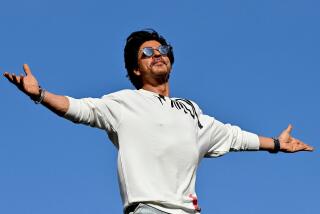Bollywood’s Amitabh Bachchan remains a leading force
- Share via
Reporting from Mumbai — — Amitabh Bachchan is annoyed. Bollywood’s most enduring superstar and oldest leading man is routinely asked one question that he finds a trifle irritating: At 68, when most of his contemporaries have retired into anonymity, how does he manage to stay at the top of his game?
“I find this constant questioning of why I am doing so much or where is the energy coming from unnecessary,” Bachchan says. “I feel like the person asking is suggesting that I’ve already done enough. I’m an actor. I should just keep acting. People have pre-conceived age limits. I find that nonsensical.”
The question is hard to avoid because Bachchan, who has two grandchildren, keeps a schedule that would make a younger man weep. On Friday, his 182nd film was released globally. It’s called “Bbuddah Hoga Terra Baap,” which is irreverent slang that loosely translates into: “Your old man must be old, not me! “ The film features Bachchan as a flamboyant, arrogant, retired hit man who comes to India from Paris to do one last job.
Bachchan’s character is actually called Bbuddah (old), but he is given to wearing gaudy shirts, boots and aviators. And he resents being called old. He prefers to think of himself as the “cool ka school” or the school of cool. One attraction of Bbuddah is Bachchan singing. He’s done a song, a cappella style — a first for him and apparently Bollywood. He’s also embarking on a rigorous publicity tour, which includes recording trailers in five languages.
But Bachchan won’t be taking a breather after release. Because he has another film, “Aarakshan” (“Reservation”), releasing in August and midmonth, he begins shooting the fifth season of “Kaun Banega Crorepati,” the Indian version of “Who Wants to Be a Millionaire.” (Incidentally, in “Slumdog Millionaire,” Jamal gets the first question right because as a child he waded through feces so he could procure the autograph of Amitabh Bachchan).
In between films and television shows, he also does commercials. Bachchan endorses seven to eight products annually, including a leading bank and a men’s apparel brand. And he also manages to maintain a blog and tweets daily (his Twitter bio reads: “Actor … well at least some are still saying so!!”).
Bachchan is no longer Bollywood’s highest-paid leading man. That distinction goes to the triumvirate of Khans — Aamir Khan, Salman Khan and Shah Rukh Khan (no relation) — who became A-list stars in the early 1990s and continue to be the most sought after names in the business. Bachchan, whose wife, Jaya, son Abhishek and daughter-in-law Aishwarya are also famous actors, occupies Bollywood’s elder statesman slot. “Bbuddah” has been made by their in-house production company. According to various media reports, he earns $12 million to $15 million per year.
Audiences, it seems, just don’t tire of this lanky actor with intense, brooding looks and a deep baritone. Bachchan was born in Allahabad in the North Indian state of Uttar Pradesh and comes from a literary family — his father, Dr. Harivansh Rai Bachchan, was a Hindi poet. Bachchan’s first film, “Saat Hindustani” (Seven Indians), was released in 1969, and in the four decades since then, he has ruled the Hindi film industry like a colossus. He ascended to the A-list playing variations of a character that was widely labeled as the angry young man — essentially an anti-establishment loner who single-handedly battles the corruption and venality of the Indian state. Through the 1970s and ‘80s, the character embodied the frustration and anxiety of an entire generation and Bachchan became the stuff of legend.
In 1982, when Bachchan suffered a near-fatal intestinal injury while shooting a stunt, India came to a standstill. Then-Prime Minister Indira Gandhi visited the critically ill actor in the hospital while thousands of fans organized prayer meetings and performed rigorous rituals in his name. When Bachchan survived, so did his character in “Coolie,” originally bound for a dramatic end. Director Manmohan Desai said it would be inappropriate for the character to die when the actor who played him had triumphed over death.
In 1992, Bachchan took a sabbatical — a decision he now describes as “terrible and foolish.” He returned in 1997 to grapple with a new generation of viewers who were less than enthusiastic in their response. For four years, Bachchan found himself in an artistic wasteland, playing tired caricatures of the angry young man, but he finally found his footing with the first season of “Kaun Banega Crorepati.” The show was a blockbuster, and Bachchan was once again a marketable star — only now, in the role of the benevolent patriarch.
His new film hopes to subvert this image by creating the angry old man, referencing many of Bachchan’s best-known characters and having him partake in fairly strenuous action sequences. But this, Bachchan says, was not his biggest challenge: “The hardest part about being a leading man at 68 is acceptability. The largest percentage of viewers in India is between 18 and 35, and if they aren’t interested in seeing an old man, then you had better just pack up.”
Which he shows no signs of doing. The actor, who in a 1999 BBC online poll was voted “Greatest Star of Stage or Screen” ahead of Laurence Olivier and Robert De Niro, describes himself as “an insecure actor” who always feels that he’s “not doing enough to better a shot.” He has played almost every role that Bollywood offers — hero, villain, comedian, patriarch — but he is eager to explore fresh avenues. “I want to feel that I’ve never done this before.”
Often Bachchan finds himself working with the sons and daughters of filmmakers with whom he started his career. He hopes this younger generation will create roles for him so that he can continue his seven-days-a-week work schedule. “The camera is the most beautiful part of my day,” he says. “Every element of my body and mind comes into play.” He pauses, then adds: “I don’t know what I will do when the work stops coming.”
More to Read
The biggest entertainment stories
Get our big stories about Hollywood, film, television, music, arts, culture and more right in your inbox as soon as they publish.
You may occasionally receive promotional content from the Los Angeles Times.










